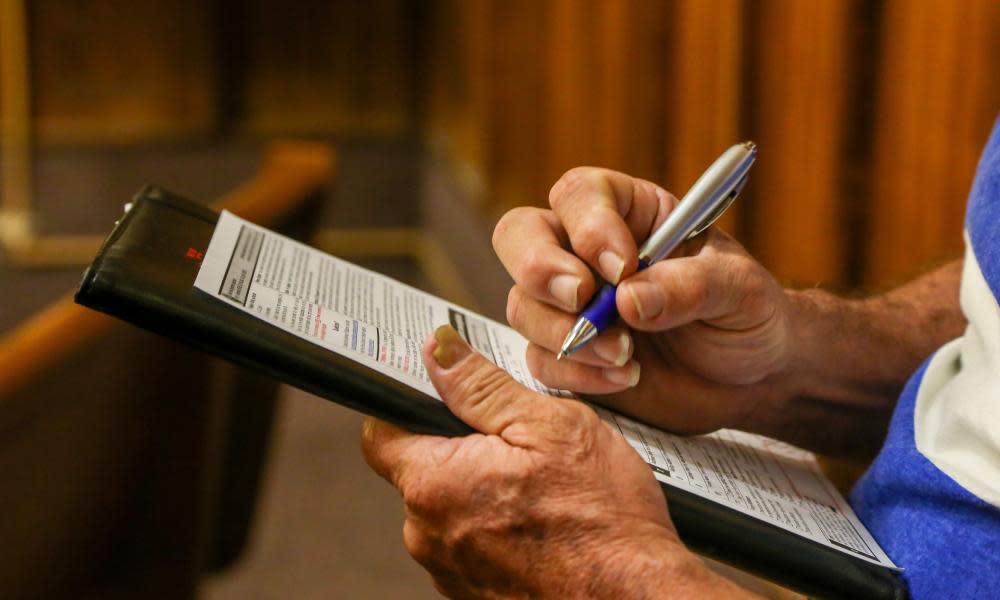'I feel pride': incarcerated residents of Washington DC register to vote for first time

On a Wednesday afternoon earlier this month, Tony Lewis Sr, a former Washington DC drug dealer in his 32nd year of a life sentence, didn’t imagine anything exciting was in the cards. Then a prison counselor at the correctional institute in Maryland told him his voter registration form had arrived.
“I couldn’t believe what I was hearing,” he told his son, Tony Lewis Jr, via text message. “I feel pride today, I feel like a real man, a citizen of my community and city.”
Lewis Sr’s joy stemmed from legislation passed by DC’s council in July, extending the right to vote to incarcerated residents for the first time, a right that only Maine and Vermont currently allow. The DC Board of Elections says it has sent registration applications to 2,400 people in prison since the law passed, allowing them to vote in November’s presidential election. That number is lower than the 4,500 DC residents who were believed to be incarcerated earlier this year, a discrepancy likely in part due to prisoners being released because of Covid-19.
But pinpointing an exact number is also difficult for DC officials because, unlike states, the nation’s capital doesn’t have its own prison system, meaning its incarcerated residents are scattered in over 100 federal facilities across the country.
Related: Trump doesn’t seem to understand how voting works. Here’s what you need to know
“We have no information other than the information we’ve been provided,” said Alice Miller, the executive director of the DC Board of Elections. “This is [the number the Federal Bureau of Prisons] gave us. This is what they identified.”
Despite these complications, advocates of voting rights for felons have hailed DC’s new legislation as hugely significant in the precedent it sets in reversing the suppression of votes of Black Americans like Lewis Sr, nationwide. US restrictions on voting rights for felons are among the world’s harshest, and many were created to disenfranchise Black Americans after they gained voting rights in the Jim Crow era.
According to the Sentencing Project, an advocacy and research organization, Black American adults are over four times more likely to lose their voting rights than other Americans, and overall, 2.2 million Black Americans are banned from voting.
“This is part of an individual’s right to participate in democracy,” said Kaitlin Banner, the deputy legal director of the Washington Lawyers’ Committee for Civil Rights and Urban Affairs.
In other places in the country, the process has not been as smooth. In 2018, Florida voters approved an amendment that re-enfranchised 1.4 million people. For a state where 537 votes decided the 2000 US presidential election, the amendment underlined the potential power of restoring voting rights for people with felony convictions. But Republicans have been working to gut it ever since.
Many of the re-enfranchised will be voting for the first time in decades, or, if they were incarcerated as juveniles, in their entire lives.
Related: Does mail-in voting lead to fraud – and does it help Democrats? The facts
“Committing a crime does not mean that you’re no longer a citizen,” says Lewis Jr, whose father’s incarceration spurred him to become an activist who helps felons reintegrate into the community. “You should still be able to participate in the political process.”
With the system stacked against that idea, Lewis Jr says his father never even thought voting was something he would ever be able to do. Now, he says, his father is energized.
“It’s really a way for him to contribute,” he said. “Many times people that are incarcerated [find it] hard to feel a part of what’s going on in the world.”
The feelings are similar for Marion Crawford, a 40-year-old Black American from DC who has been incarcerated since 1997, when he was a juvenile. “I was ecstatic,” he said about gaining the right to vote. “It also makes me feel like I belong. I’m just looking forward to being a part of the process – just part of the community.”
Committing a crime does not mean that you’re no longer a citizen...You should still be able to participate in the political process
Tony Lewis Jr
For Crawford, voting for the first time will be especially exciting given the high stakes of the 2020 election.
“Everything in the state of politics, the country as a whole one now – it’s rough, but I’m hopeful because I think it’s like an awakening going on.”
Given the challenges of implementing the new law, especially during the pandemic, the DC council did not mandate that the election board send ballots to prisoners this year. But Robert C White Jr, the councilmember who led the effort to pass the legislation says that’s still the goal.
He said the board of elections has been working with the Bureau of Prisons to distribute educational materials and voter registration forms. For White, the new legislation is about giving citizens like Lewis Sr and Crawford an opportunity to engage with society that they never should have lost.
“I’m really proud, not just as a local DC guy, but as somebody who believes very much in second chances and the need to give more humanity to incarcerated and formerly incarcerated people,” he said. “Now that the District of Columbia has restored the right to vote for incarcerated felons, no state can say that it can’t or shouldn’t be done.”

